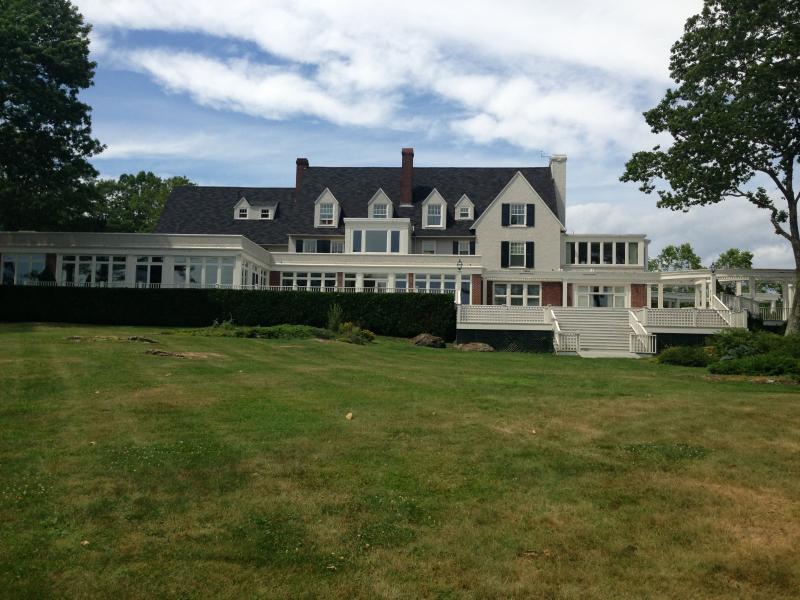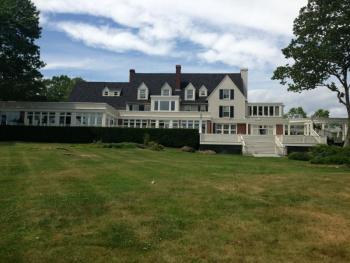Renewed effort to make Camden's Fox Hill estate an alcohol and substance abuse rehab center begins
 The unoccupied Fox Hill estate, on Bay View Street in Camden, is again the possible home of an alcohol and drug rehabilitation facility. (Photo by Lynda Clancy)
The unoccupied Fox Hill estate, on Bay View Street in Camden, is again the possible home of an alcohol and drug rehabilitation facility. (Photo by Lynda Clancy)
 The view from the top floor of the Fox Hill cottage that expands over Penobscot Bay. (Photo by Lynda Clancy)
The view from the top floor of the Fox Hill cottage that expands over Penobscot Bay. (Photo by Lynda Clancy)
 A model of Fox Hill is housed in one of the estate's buildings, near the bowling alley.
A model of Fox Hill is housed in one of the estate's buildings, near the bowling alley.
 The bowling alley at Fox Hill is just one of the resort-like amenities built by former owner Charles Cawley.
The bowling alley at Fox Hill is just one of the resort-like amenities built by former owner Charles Cawley.
 There is also a soda fountain at Fox Hill.
There is also a soda fountain at Fox Hill.
 Fox Hill has some deferred maintenance
Fox Hill has some deferred maintenance
 Philip Levendusky, associate professor of psychology at Harvard Medical School and senior vice president for business development and marketing, as well as director of the psychology department at McLean Hospital, tells the planning board that the proposed Fox Hill facility would offer state-of-the-art programs and would typically treat clients on a 30- to 60-day basis. (Photo by Lynda Clancy)
Philip Levendusky, associate professor of psychology at Harvard Medical School and senior vice president for business development and marketing, as well as director of the psychology department at McLean Hospital, tells the planning board that the proposed Fox Hill facility would offer state-of-the-art programs and would typically treat clients on a 30- to 60-day basis. (Photo by Lynda Clancy)
 The unoccupied Fox Hill estate, on Bay View Street in Camden, is again the possible home of an alcohol and drug rehabilitation facility. (Photo by Lynda Clancy)
The unoccupied Fox Hill estate, on Bay View Street in Camden, is again the possible home of an alcohol and drug rehabilitation facility. (Photo by Lynda Clancy)
 The view from the top floor of the Fox Hill cottage that expands over Penobscot Bay. (Photo by Lynda Clancy)
The view from the top floor of the Fox Hill cottage that expands over Penobscot Bay. (Photo by Lynda Clancy)
 A model of Fox Hill is housed in one of the estate's buildings, near the bowling alley.
A model of Fox Hill is housed in one of the estate's buildings, near the bowling alley.
 The bowling alley at Fox Hill is just one of the resort-like amenities built by former owner Charles Cawley.
The bowling alley at Fox Hill is just one of the resort-like amenities built by former owner Charles Cawley.
 There is also a soda fountain at Fox Hill.
There is also a soda fountain at Fox Hill.
 Fox Hill has some deferred maintenance
Fox Hill has some deferred maintenance
 Philip Levendusky, associate professor of psychology at Harvard Medical School and senior vice president for business development and marketing, as well as director of the psychology department at McLean Hospital, tells the planning board that the proposed Fox Hill facility would offer state-of-the-art programs and would typically treat clients on a 30- to 60-day basis. (Photo by Lynda Clancy)
Philip Levendusky, associate professor of psychology at Harvard Medical School and senior vice president for business development and marketing, as well as director of the psychology department at McLean Hospital, tells the planning board that the proposed Fox Hill facility would offer state-of-the-art programs and would typically treat clients on a 30- to 60-day basis. (Photo by Lynda Clancy)
CAMDEN – A proposal to turn the 13.8-acre Fox Hill estate on Bay View Street in Camden into a high-end residential alcohol and substance abuse treatment facility for up to 12 clients at a time is back on the table with a zoning change request made Thursday evening to the town’s planning board.
This is the second attempt to establish a treatment center at the former Borden Cottage, a sprawling building and complex of outbuildings at 235 Bay View Street near the Rockport town line and which has been expanded in many directions since first constructed in 1903.
“We seek to have a zoning amendment before the voters in the fall,” said Camden-based attorney Paul Gibbons, speaking to the Camden Planning Board at its 5 p.m. meeting July 25. “People in the industry tell is that if we are successful in getting approval we will have the best facility in the country.”
Related stories:
Camden’s Fox Hill changes hands, its future under consideration
McLean Hospital looks to Camden's Fox Hill for alcohol, drug rehab center
Camden's Fox Hill rehab deal nixed by landowner, buyer mystified
The amendment he crafted for his clients, Fox Hill Real Estate LLC, would adjust the town’s coastal residential district parameters to allow special exceptions for “residential treatment facilities for comprehensive alcohol and related substance abuse disorders providing concurrent treatment for addiction and/or other associated psychiatric disorders.”
Proposed conditions stipulate that treatment facilities in the coastal residential district would contain a minimum of eight beds and a maximum of 16 beds on parcels 10 acres in size or larger. Minimum building setbacks from roads would be 100 feet; sidelines, 50 feet. No out-patient clinics would be allowed, and change of operator or tenant operating such facilities would require new planning board approvals. Click on the PDF below to read the complete proposed ordinance change.
Last February, there was an effort to purchase the estate for such a center. McLean Hospital, associated with Harvard Medical School and Massachusetts General Hospital, was in talks with Lincolnville summer resident H. Thompson Rodman in that initiative. That proposal died when real estate negotiations between Rodman and then Fox Hill owner Ellen Simmons fell through.
Since then, 24 investors pooled their money, formed Fox Hill Real Estate LLC and purchased the historic and high-profile estate. They closed the deal on May 30, when the property, which had been listed at $4.9 million, quietly changed hands for $2.7 million. The land and the buildings are currently assessed by the town at $6.5 million.
McLean Hospital is again partnering with the investors to develop a 12-bed program for the estate, which is one mile equidistant from downtown Camden and Rockport Village. It is anchored by a 16,000-square-foot, 10-bedroom house that sits on the east side of a slight hill overlooking Penobscot Bay. While the land is not on the shore, it is extensively developed and landscaped. Besides the large original cottage, there are three guest cottages with room for 32 guests.
Philip Levendusky, associate professor of psychology at Harvard Medical School and senior vice president for business development and marketing, as well as director of the psychology department at McLean Hospital, told the planning board July 25 that the proposed Fox Hill facility would offer state-of-the-art programs and would typically treat clients on a 30- to 60-day basis. He said the McLean Hospital Board of Directors approved the proposal at its meeting last week and intends to move forward in partnership with Fox Hill Real Estate, contingent on voter approval of the zoning amendment and regulatory approval from the state.
“We’re probably talking about 100 patients receiving care [in a year],” he said.
Fox Hill would neither be an insurance nor a state-based facility, he said. Clients would not be sent from court or the criminal justice system. Clients would seek treatment voluntarily, and such treatment is not covered by health insurance.
“This is a self-paid kind of program,” he said. “Unfortunately and fortunately, that will dictate the socio-economic status of the individual.”
Anticipated cost of staying for one month at Fox Hill and receiving treatment is approximately $60,000.
He said the facility’s programs would be directed to a national audience and likened it to McLean’s Fernside center in Princeton, Mass., where, he said, “we have been considered exceptional neighbors.”
According to an introductory document submitted by McLean Hospital to the planning board, clients would recover in therapy “while residing in a world class, serene retreat that facilitates the recovery process.”
The hospital, according to its description, has been “a world leader in the treatment of chemical dependency and mental illness,” and since 1811 has conducted research into the cause of mental illness. It has trained generations of mental health care providers and was ranked by U.S. News and World Report as No. 1 as the country’s psychiatric hospital.
At Fox Hill, 23 staff members would be hired working in three separate shifts. The facility would be staffed 24-7, and the facility would contract with local businesses for laundry, landscaping and catering.
Goals outlined call for “close collaboration with the local Camden medical and behavioral health community.”
The investors and McLean have also stressed that the facility will be discreet, and there will be no tolerance of paparazzi.
Who would own it, who would run it?
The estate, once owned by MBNA bank president Charles Cawley and wife Julie, includes a swimming pool, buildings housing arcade games, billiards and ping-pong rooms, a 1950s-style diner, and a four-lane bowling alley. There is also a large office building and expansive garages that had housed Cawley’s 72-car collection. Besides being a summer cottage, the estate has been used informally for entertaining and business, especially during the late 1990s and early part of the new century.
It was subsequently sold to Matthew Simmons in 2009 for $6 million. He had envisioned the property in 2010 as a conference center for his Ocean Energy Institute. A community outcry ensued and the project was delayed. Simmons died that summer, and in 2012, the compound was listed on the market for $5.5 million. The price was dropped, and was most recently listed with Legacy Properties for $4.9 million, with the owner as Fox Hill Investments LLC.
Fox Hill today is a lonely place, with the sheen wearing off the longer it sits unoccupied. Cracks have appeared in the stucco facade, and at least 20 windows need replacing. Some sills have rotted, and one of the cottages built on top of a metal tennis platform is deteriorating from water damage. Brush and bushes have crept over fences and pools of water have collected on uneven decks and inside portions of the old garages. Green moss is growing on outside fencing and decks and in some areas, black mold has crept into studs that need replacing.
If the business of running a rehab center is approved, the business arrangement calls for Fox Hill Real Estate LLC to function as a for-profit landlord, paying taxes on the property (which are currently approximately $100,000 per year), and leasing space to the nonprofit McLean Hospital.
Those investors have not been named, although Rodman is one, as well as Merril Halpern, of Rockport, who is also the LLC manager. Others are local, some from as far as Texas, said Rodman.
“We’re learning,” said Halpern, about maintenance. “We know there’s going to be some surprises.”
The entire facility is approximately 62,000 feet of built structures; the original cottage itself is 16,000 to 18,000 square feet. The new owners anticipate demolishing the middle section of the garage.
Annual costs of running Fox Hill as a real estate company are approximately $450,000. That breaks down to approximately $100,000 allocated for property taxes; $100,000 for fuel, $50,000 for landscaping; $30,000 to $40,000 in electricity costs; $50,000 to $60,000 for fulltime maintenance staff, and another $100,000 in general maintenance.
Halpern, whose background is in finance, said the investors are, “friends of Tom and friends of mine who support this project.”
Fox Hill Real Estate is “a single purpose LLC and formed just to acquire this property and enter into a lease with McLean to enter into a longterm relationship for this facility,” said Halpern. “I’m supportive of Tom. I believe in the mission of the project. It is the best use of this property and believe it will deteriorate if it is not put to good use.”
The investors maintain that the estate has been busier, with far more commotion, under previous owners than what is being proposed.
The treatment center on the site, said Halpern, will serve “the highest purpose with the lowest impact the property has seen in decades.”
Camden Planning Board says slow down
At the July 25 meeting, the Camden Planning Board’s vice chairman Lowrie Sargent told Paul Gibbons that the November ballot for a proposed ordinance change was unrealistic.
“I would say that is impossible,” said Sargent.
He outlined the process, as did Stephen Wilson, Camden planner and code enforcement officer, saying the planning board would require several meetings: one to discuss it as a board, the other a general informational meeting, then two public hearings. Other factors affecting the process including the timing of the ballot printing and circulation of absentee ballots.
“The decision we make here is to make a recommendation [to the Select Board on whether to include on the ballot],” he said. “We have to have the recommendation by the end of August to the Select Board.”
He said that in February there was much public interest in the project, and said the process culminates in a town decision.
“We don’t want the town to believe that we are championing any cause or not any cause,” said Sargent.
He said project proponents are also free to request a special town meeting if they do not want to wait for June Town Meeting to ask for a zoning change.
“I guess my option is to talk to the selectmen and have a meeting next week,” said Gibbons.
If Camden voters ultimately vote not to allow the proposed treatment center, the investors have talked generally about subdividing the property into individual house lots. How many house lots would be allowed under the existing ordinance is subject to the application of open space zoning on the property itself, said Wilson.
There has been no formal subdivision planning of the property, and the investors remain firmly behind the idea to make Fox Hill a treatment center. Neighbors were invited to a meeting with Levendusky on July 22 at Fox Hill to hear about the center.
“If things don’t come to fuition we’ll look to alternatives,” said Halpern, July 26.
Read more about the cottage history in Portland Monthly Magazine, Winterguide 2012
Editorial Director Lynda Clancy can be reached at lyndaclancy@penbaypilot.com; 706-6657.
Event Date
Address
United States



































